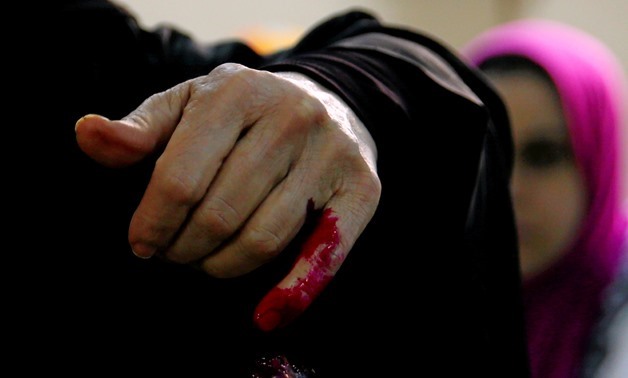
An Egyptian woman has her finger stained with ink after casting her vote during the first day of the presidential election at a polling station in Cairo, Egypt, March 26, 2018. REUTERS/Amr Abdallah Dalsh
CAIRO – 27 March 2018: Once the presidential election between incumbent President Abdel Fatah al-Sisi and Ghad Party Chairman Moussa Moustafa Moussa started on Monday, high turnout was reported in the 13,706 polling stations nationwide. However, it has also been widely recognized that a considerable number of the electorate has been absent.
A number of individuals who decided not to vote expressed different reasons, and surprisingly, not all are of a political character.
Mostafa Khaled, an engineer, told Egypt Today that the polling station he should vote in is very far from his house, because his national ID carries a different address than his current one. He also mentioned that he should stay at home to look after his younger siblings.
Demyana Magdy, who was born in Luxor but resides in Cairo, said that she does not know whether she is allowed to vote in a polling station in Cairo. “If I can, I will go and cast my vote,” she stated.
Sayed, Abdel Samee and Mohamed, despite being of different ages, said that they are too busy and that they may not be able to vote because they have to work.
Marwa Al-Bendary said that she is not concerned with the political process, adding that her work as a project manager does not even allow her enough time to sleep.
However, some voters hold political reasons behind their decision not to vote. Some of them said that Moussa is not a strong challenger to Sisi, so they decided not to vote, although some of them said they are Sisi supporters.
Manal Abdel Aal posted on Twitter that she met many people who support Sisi but will not cast their votes because they think that he will win the race anyway. She also referred to the time when millions of Egyptians demonstrated in the streets in the January 25 Revolution, while others preferred to support them while staying at home.
Salma Emad and Esraa Goda said that voting will not change anything, as Moussa does not have any real chance of winning. When Mahmoud Moussa was asked whether calls for an election boycott will affect the election process, he said that the calls were not effective.
Mohamed Abdel Samee said that his whole family, except him, casted their votes. He stated that he is a Sisi supporter but did not make a decision yet on whether or not to vote. He said that he criticizes the way the government pressured street shop owners to hang pro-Sisi posters, according to him, which may make him decide not to cast his vote.
Calls for boycotts have always existed in each election or referendum over the past six years following the January 25 Revolution. However, the election turnouts have proven that boycott calls are not always effective.

Several politicians and human rights activists have called for boycotting the 2018 election, including 2012 presidential candidates Abdel Moneim Aboul Fotouh and Hamdeen Sabahi, claiming that the vote between Sisi and Moussa will not be fair. However high turnout has been reported during the first day of the election.
After the ouster of MB-affiliated President Mohamed Morsi on July 3, 2013, President Sisi resigned from the Egyptian military to run for president in the 2014 presidential election. The Muslim Brotherhood defamed Sisi and used various forms of propaganda against him, including graffiti. However, Sisi won 96.9 percent of the vote, with a turnout of 47.45 percent, according to Judge Anwar al-Asi, head of the presidential election committee at that time.
Despite strong opposition to the 2012 constitutional referendum by various political figures – including former Arab League Secretary-General Amr Moussa, former Cairo University President Gaber Nassar; and Anwar Esmat Al-Sadat, nephew of late President Anwar Sadat – about 32.8 percent of the electorate participated in the vote. More than 10.6 million voted in favor of the constitution, while more than 6 million opposed it.
Before the second round of the 2012 presidential election between Morsi and Ahmed Shafik, a considerable number of people thought that none of the candidates should come to power because they “do not represent the Egyptian revolutionaries.” Many people on social media had announced they would boycott the vote, using hashtags such as “boycotters”. However, the turnout was about 52 percent.


Comments
Leave a Comment